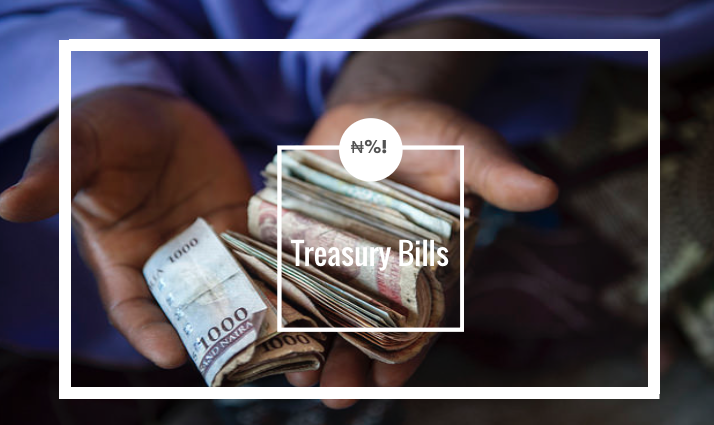- Investors Await N62.4bn Maturing Treasury Bill
Treasury bills maturity of 91-day and 182-day worth N62.4billion are expected to hit the market this week.
However, the maturing fixed income is expected to be offset by a rollover of the same amount while an open market operation (OMO) maturity of N168.1 billion is also expected to hit the system this week.
Analysts at Afrinvest West Africa Limited stated this in a report at the weekend, expressing optimism that the move would impact liquidity dynamics great deal.
But, they held the view that the aggressive liquidity mop-up signal of the Central Bank of Nigeria (CBN), would keep the open buy back (OBB) and overnight rates in check.
Financial system liquidity stayed negative on all trading days of trading last week, owing to increased primary market issuances and the Retail SMIS (Secondary Market Intervention Sales) foreign exchange auction conducted by the CBN during the week.
The CBN mopped up a total of N28.6 billion in OMO sales on four of five trading days of the week which hampered system liquidity. Thus, open buy back and overnight lending rates remained in double digits from the start of the week before rising to 105.0% and 107.8% last Wednesday from 25.0% and 26.3% respectively in the previous trading day. OBB and overnight rates dropped 58.3 percentage points and 55.6 percentage points to 46.7% and 52.2% respectively on Thursday as a result of an OMO maturity inflow of N113.05 billion into the system. Consequently, rates closed at 55.8% and 59.3% on Friday, up 33.8 percentage points and 36.8 percentage points week-on-week respectively.
At the treasury bills segment of the market, the Federal Executive Council approved the issuance of dollar-backed treasury instruments in the international capital market in order to reduce the country’s huge debt profile.
“Whilst we believe that this policy would enable the government to restructure the country’s debt profile by borrowing more in foreign currencies than naira, we expect that this will also drive down government’s borrowing cost while also lengthening the tenor for repayment,” Afrinvest stated.
Nevertheless, the treasury bills market closed bearish last week as average yield across benchmark bills rose 61 basis points week-on-week to settle at 18.5 per cent, owing to tight system liquidity. Average yields dropped at the start of the week, down 18 basis points to 17.7 per cent as investors showed interest in the market. However, yields trended upwards on the remaining days of the week owing to bearish sentiment towards short and medium term instruments. Consequently, average yield across benchmark instruments closed at 18.5 per cent last Friday.
Forex Market Outlook
In the forex market last week, the CBN continued with its weekly intervention in order to boost forex liquidity and keep investors’ confidence upbeat.
The CBN also auctioned US$100 million SMIS last Wednesday for the clearance of the backlog of matured forex obligations for raw materials and machineries, agriculture, airlines, petroleum products, letters of credit and bill for collection.
But at the official market, the naira exchange rate stayed flat at N305.55/$1, while it appreciated 0.4 per cent week-on-week to close the week at N365.91/$1 on the FMDQ NAFEX segment from N367/$1 the preceding week. The interbank NIFEX market also traded within similar level but depreciated 47 basis points to close at N365.20/US$1.00 from N363.49/US$1.00 in the previous week.
Also, the parallel market traded within a tight band with rate remaining unchanged from preceding week’s close of N367/$1.
“We opine that the convergence in rates between the NAFEX and Parallel market shows the high level of investor confidence in the CBN’s FX policy and continues to serve as a representation for the potential impact of the adoption of a full-fledged flexible exchange rate regime.
“In the FMDQ OTC Futures segment, the lukewarm appetite for contracts which has been recorded in recent weeks continued as investor appetite remains dampened by the upward revision of contract prices. During the week, the total value of open contracts marginally increased by US$53.1 million to US$2.6 billion as the NG/US AUG 2017 contract enjoyed the most buy sentiment.
“We believe the stability in the forex market will be sustained in the short to medium term as the CBN continues its drive to boost forex liquidity at the different segments of the forex market. Hence, we expect to see rates at current levels in the coming week,” they added.
Bond Market Review
Performance of the domestic bond market last week was bearish as investors’ interest stayed soft. Average yield stayed flat at 16.8 per cent on Friday, up five basis points week-on-week. Analysts anticipated that this week, yields might trend higher as investors free up positions ahead of the August Bond auction slated for 23rd August, 2017.
Also, across the Nigerian Corporate Eurobonds, performance remained mixed as Tier-1 banks’ bond yields fell while some Tier-2 yields rose. Investor interest was majorly centered on the ZENITH 2022 and 2019 bonds (which fell 17 basis points and three basis points respectively).
Debt Refinancing
As stated earlier, badly weighed down by the debilitating effect of Nigeria’s huge debts, the federal government last Wednesday sought a way out, approving the issuance of dollar-backed Treasury bills even as it extended the maturity period from between 91 and 364 days to two and three years respectively.
The initiative, according to an economic expert, who spoke said it was an impressive policy that would enable the government to restructure the country’s debt profile by borrowing less in naira but more in foreign currencies, explaining that it would bring down interest rate and facilitate the economy’s exit from recession. The federal government also approved the 2018-2020 Medium Term Expenditure Framework and Fiscal Strategy Paper (FSP), pegging oil benchmark at $45 and retaining the prevailing N305/$ exchange rate. The Minister of Budget and National Planning, Senator Udoma Udo Udoma, said the MTEF targeted 3.5 per cent growth rate in 2018, 4.5 per cent in 2019 and 7 per cent in 2020, adding that government projected at 2.3 million barrel per day production volume.
Throwing light on the shift from naira denomination of treasury bills to dollars, the Minister of Finance, Mrs. Kemi Adeosun, said the council approved a memo restructuring the issuance of treasury bills using dollar instruments subject to the approval of the National Assembly. According to her, the extension of the tenor of Treasury bill from the current 91 and 364 days to two and three year period would provide the government with relief from the pressure to repay the debt. She also said the new initiative would reduce government borrowing to $3 billion, create more room for banks to lend money to private investors and consequently force down interest rates.
She explained that issuing the treasury bills in dollar instrument was not synonymous with paying interest in dollars but would instead, provide the government with the opportunity to obtain a bond in the international capital market and pay the debt in a cheaper way.
I & E Window
The importers’ and exporters’ forex window introduced by the CBN about four months ago has attracted $4 billion from foreign investors between April and now, the Bankers’ Committee disclosed last Thursday. This was a $1.8 billion growth over the $2.2 billion recorded in June. The window also posted a single transaction of $240 million on August 1, 2017.
Addressing reporters in Abuja Thursday at the end of its 34th meeting, the Bankers’ Committee said the economy was on the recovery path and on the verge of exiting the recession, going by various indicators.
The Director, Banking Supervision of the CBN, Mr. Ahmed Abdullahi; Managing Director, Union Bank of Nigeria Plc, Mr. Emeka Emuwa; Managing Director, FSDH, Mrs. Hamba Amba; and Executive Director, Standard Chartered Bank, Mrs. Mobola Faleye, addressed the press.
The committee noted that the FX market has continued to record positive gains, with the various exchange rates in the market nearing convergence.


 Forex2 weeks ago
Forex2 weeks ago


 Naira1 week ago
Naira1 week ago
 Naira4 weeks ago
Naira4 weeks ago
 Company News4 weeks ago
Company News4 weeks ago




 Naira2 weeks ago
Naira2 weeks ago
 Billionaire Watch1 week ago
Billionaire Watch1 week ago




 Naira1 week ago
Naira1 week ago




 Naira3 weeks ago
Naira3 weeks ago




















